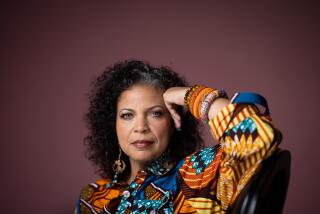Op-Ed: Lena Dunham: Sandra Bland had big plans to help women before she died
- Share via
On July 13, #BlackLivesMatter activist Sandra Bland was found dead in a police holding cell, three days after being arrested by a Texas state trooper during a routine traffic stop. Her death led to calls for an investigation and protests across the country.
At the time of her arrest, Bland was collaborating with longtime friend and writing partner Chenai Okammor on a website — called Woman4Woman — devoted to empowering women around the world to write and share their stories.
Okammor spoke with “Girls” creator and Lenny newsletter co-founder Lena Dunham about Bland’s life and death, and their passion for helping women express themselves.
Lena Dunham: Where did you meet Sandra?
Chenai Okammor: We met when I retired and joined a church committee that she was on. She reminded me of myself when I was younger. There was a lot in me but the self-confidence wasn’t there.
I was born in Rhodesia, now Zimbabwe, and came from a tradition where women and young girls have a very specific role. If I was sitting down to have dinner I would not start eating until all the older people around me had started. As a woman in my culture, you don’t talk about a lot of things.
Sandy was raised by a single mother with a bunch of sisters. And she said that when she was growing up, she held back her thoughts at times. What became clear to me as I met more with Sandra was that she was finding her own voice.
She once said to me, “I’m 28 and I’m just now beginning to identify what I stand for.” When she started working on this project, I asked her what she wanted to accomplish with it. She said, “I want to be able to share my story with young women out there.” Because she still thought she was alone in her quirkiness.
She had such a commitment to having women tell their own stories, and she helped them talk about things they hadn’t talked about before.
LD: What struck me about Sandra is that she was an activist and a person who knew her rights and knew the concept of police brutality and men abusing their power. It must have been especially painful and personal for her to be arrested in this way.
CO: Yes. For days after I got the phone call from her sister I didn’t watch TV, I didn’t listen to the radio. I did not open myself to anything the world had to say because I knew how Sandra felt about men using their power for something not good for anybody.
Sandy was really specific about how she wanted the world to notice her. She had a beautiful body. She was 5’ 10”, but she was built like a brick house. Maybe you’re too young to remember the song “Brick House”…
LD: Yes! I remember it. [Laughs]
CO: She was athletic and simply gorgeous. Legs that I go to the gym twice a day for! She was just discovering her own strength beyond the physical, focusing on intellect and spirituality. She was also focusing on how to share the things she was passionate about with the world. Then she started her writing.
I noticed there was a theme in her writing: visibility. One thing she wrote about was watching a Starbucks’ drive-through for a few hours. The Starbucks was always crowded and they have people come out to the cars and take orders and bring people their coffee. She watched a woman run back and forth, taking orders. And Sandy said not one person really smiled at that woman. Sandy wanted people to notice her.
LD: When you heard the story of what had happened — which I know is still unfolding — was it hard for you to put together the pieces of what had occurred?
CO: I’m still having a hard time with that. The reason my brother and I were sent to my father in New York was because there was a guerrilla war for independence in Rhodesia. So many people were killed. You’d hear the adults say, “Steven is missing now.” Everyone just had this look when they talked about it. That’s the same feeling I got with Sandy.
LD: Horrible.
CO: It was horrible. And when I saw the pictures of the prison that she was in, it’s archaic. I don’t know if they call that a place to put anybody in. This is America. And with Sandy’s death, I’m going through the same exact thing I went through in Rhodesia.
This interview has been condensed and edited.
If you want to read more stories like this, sign up for the Lenny newsletter, coming to your inbox this fall.
FULL COVERAGE ON SANDRA BLAND:
Sandra Bland: Texas records show racial breakdown of those stopped by same trooper
Sandra Bland’s family cites ‘plethora of questions,’ files suit over her death in Texas jail
Officials in Texas, alleging death threats, release new Sandra Bland jail video
More to Read
A cure for the common opinion
Get thought-provoking perspectives with our weekly newsletter.
You may occasionally receive promotional content from the Los Angeles Times.






